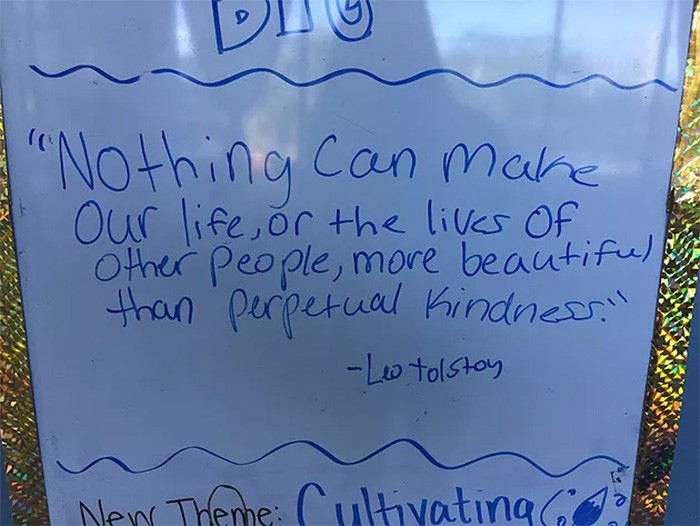Here at Indi-ED, our students work HARD. They write, edit, revise, and publish informational essays. They complete long-term, complex projects on subjects such as history and engineering. They take pre- and post-assessments to demonstrate their progress in all subjects. The list goes on.
HOWEVER, what makes us different is that, if we need to, we are able to take time out from our regular curriculum to discuss the truly important ‘subjects’ in life. Topics such as kindness, respect, trust, bullying, cultural bias, emotions, etc. We do this because we know that it is worth it, and so do our students.
One day this past week, the quote of the day lead to a longer-than-usual discussion during our morning meeting. We knew that it would take time away from our math and science lessons for that day, but again, we were okay with that. We have the flexibility to make up for it later.
The student selected quote of the day was from Leo Tolstoy: “Nothing can make our life, or the lives of other people, more beautiful than perpetual kindness.”
After initially analyzing this quote (as they do every day), our students then had a very respectful discussion on numerous topics such as kindness and it’s lasting impact, bullying causes/effects, what “popularity” means, how feelings and actions impact school environments, cultural biases, negativity in the media, among many others.
We could not have predicted this happening, and were blown away with their maturity and depth of their thoughts.
This particular morning discussion also led to a spinoff discussion within Ms. Heller’s cohort. The students felt as though the morning discussion itself was a lesson- and that life lessons they are learning at Indi-ED are truly invaluable.
One student stated: “We don’t just learn what will help us in the present. We learn things that can help us in the future.” –LM
Here are just SOME of the examples of what they are LEARNING (in their own words):
- We have learned how to handle certain amounts of ‘freedom’ and how to make good decisions.
- We learn that children are a result of their environment and their parents. We understand that. We can inspire other children so they don’t make wrong decisions.
- We learn that our passions are important, we see that our teachers have a job they love. When we grow up we want a job that is following our passions, and not just about the money. We want to love what we’re doing.
- Not many kids get to learn HOW TO BE KIND, to themselves and others. It is hard for kids to learn how to be happy with others and themselves. We are learning this.
- We discuss the causes of bullying (jealousy or other pain), so we can understand why it happens and if we get bullied, we know that it doesn’t really have anything to do with us.
- Most kids don’t get to learn to be themselves. They don’t understand the meaning of the phrase “Just be yourself”. They think that everything they see (on social media and the internet) they should follow. Instead of following, they should be the leader.
- We don’t just talk about leadership here, we actually experience it and learn how to lead.
- We learn that what you put out into the world comes back to you like a boomerang. Doing one kind gesture for someone else, can have a bigger impact. The kindness you put out goes farther than negativity. It can go across the oceans if you wanted it to.
- I’ve learned “This world is like an engine, and people are the parts. And every part is important.”- RH
Is it important for our students to focus on their academics and making progress? YES.
Is it also important for us to empower them to LEARN and GROW as kind and responsible human beings? ABSOLUTELY.


